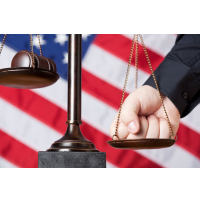Prosecutors Rarely Held Accountable for Misconduct that Leads to Convictions of the Innocent
 (graphic: iStockPhoto/Getty Images)
(graphic: iStockPhoto/Getty Images)
By Erik de La Garza, Courthouse News Service
(CN) - Prosecutors across the country are rarely held accountable for withholding evidence or other misconduct that sends innocent people to prison, the Innocence Project said in a report this week.
The Innocence Project, a legal group that advocates for the wrongfully convicted, examined 660 cases of prosecutorial error or misconduct in five states and found that only one prosecutor was disciplined.
Convictions were thrown out in 133 of the cases.
The New York-based Innocence Project released its 28-page report, "Prosecutorial Oversight: A National Dialogue in the Wake of Connick v. Thompson," on March 29.
March 29 was the fifth anniversary of the Connick v. Thompson (pdf) ruling, in which the U.S. Supreme Court reversed a $14 million award to a former death row inmate from New Orleans who spent 18 years in prison for murder, 14 of them on death row, before being exonerated.
A split panel of the Fifth Circuit had affirmed the jury's award to John Thompson against Orleans Parish District Attorney Harry Connick.
Thompson was released from prison after his defense team uncovered exculpatory evidence that prosecutors had withheld after charging him with murder and armed robbery in 1985, according to Courthouse News archives.
But the Supreme Court majority found that the district attorney's office could not be held liable, as Thompson did not prove that prosecutors were deliberately indifferent to misconduct that could have been fixed with more or different prosecutorial training.
"Despite the Supreme Court's assertion in Thompson that the public can rely on numerous systems of prosecutorial oversight to ensure that prosecutors will act within ethical and legal bounds, it is abundantly clear that, across the country, our systems of prosecutorial oversight are either failing or nonexistent," the report states.
The Innocence Project examined court rulings in Arizona, California, Texas, New York and Pennsylvania from 2004 to 2008, in which judges found prosecutors had committed violations such as mischaracterizing evidence or suborning perjury.
"There are almost no adequate systems in place to keep prosecutorial error and misconduct in check and, in fact, prosecutors are rarely held accountable even for intentional misconduct," according to the report.
The report includes recommendations to improve systems of prosecutorial oversight across the board, for prosecutors, courts, State Bar oversight entities and state lawmakers.
Recommendations include increasing transparency within prosecutors' offices, state supreme court monitoring, and allowing State Bar disciplinary committees to investigate complaints of prosecutorial error or misconduct.
The report also calls on states to enact laws limiting immunity for prosecutors.
"The Innocence Project was founded in 1992 by Barry C. Scheck and Peter J. Neufeld at the Benjamin N. Cardozo School of Law at Yeshiva University to assist prisoners who could be proven innocent through DNA testing," the report states. "To date, more than 300 people in the United States have been exonerated by DNA testing, including 20 who served time on death row. The Innocence Project was involved in 177 of the DNA exonerations."
To Learn More:
"Prosecutorial Oversight: A National Dialogue in the Wake of Connick v. Thompson” (Innocence Project)
6 of Arizona’s “Prosecutors of the Year” Engaged in Misconduct during Death Penalty Cases (by Noel Brinkerhoff, AllGov)
Prosecutors Fighting the Use of DNA Evidence in Order to Save Face (by Noel Brinkerhoff and David Wallechinsky, AllGov)
- Top Stories
- Unusual News
- Where is the Money Going?
- Controversies
- U.S. and the World
- Appointments and Resignations
- Latest News
- Musk and Trump Fire Members of Congress
- Trump Calls for Violent Street Demonstrations Against Himself
- Trump Changes Name of Republican Party
- The 2024 Election By the Numbers
- Bashar al-Assad—The Fall of a Rabid AntiSemite





Comments
moreless